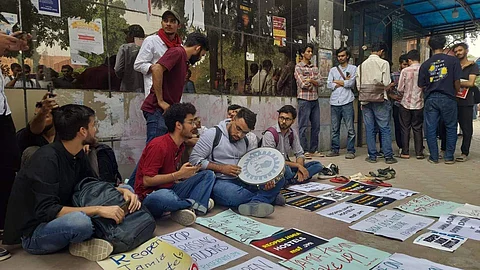

Jamia Millia Islamia (JMI) has reopened its hostel six months after the institution opened post the COVID lockdown in 2020. This decision to open up the hostels came after hundreds of students protested on campus, calling for their reopening in the first week of November. On November 15, the authorities finally issued a notification to start hostel admission registration but newly admitted students are finding it difficult to register as Identity Cards (ID) are mandatory for it but most of their cards haven't been issued yet. “The newly admitted students started their classes in August but are still struggling to find accommodation on campus. Many cancelled their admission owing to the lack of availability of hostel facility,” says a concerned student of JMI, who spoke to EdexLive on the condition of anonymity.
A partial victory
After the administration accepted the demands of the protesting students and issued a notification for hostel accommodation, students held a victory march yesterday, November 16. However, the sense of victory was partial as issues persisted and few students still found it difficult to find accommodation on campus. Farhat Zahra, a JMI student says, “Few of our demands got accepted but not all. The ID issue tops the list among them.” The newly admitted students who do not have their ID cards issued are demanding that enrollment numbers and email IDs get used for the allotment process instead. Among other problems is a huge fee hike for hostels. The hostel fees annually have hiked from Rs 5,700 in 2017-18 to Rs 15,350 for 2022-23. “Why stay in a government hostel when the price comes down to be the same?” asks a student who preferred to remain anonymous.
Let's explore the background
The JMI hostels haven’t been accessible to students for the past two years and ever since offline classes started on campus, the student body has been calling for hostels to open again. The student organisations collected signatures and submitted them to the institute authorities along with a letter demanding the immediate reopening of hostels. However, the demands of the students were disregarded. Finally, in the first week of November, all the student bodies came together and staged a sit-in protest at the Central Canteen to push the administration to start opening the hostels again. A petition submitted by the students to the Vice-Chancellor states,” We are facing serious problems when it comes to staying in the locality attached to Jamia Millia Islamia. The female students do not feel safe. Jamia consists of students from different strata of society and hence not all students can afford to pay the high rents to live outside the campus. Students have even cancelled admission due to the unaffordability to live in PGs and rooms on rent.”
The protests were held on November 3, but the authorities took twelve days to put out the notification. Students claim that initially, the administration used a hazy justification for the delay of hostel accommodations to stifle the protest but finally conceded to the persistent protests and announced that the new admission forms for the hostels will be made available soon. Nevertheless, nothing was mentioned about the newly admitted students and thus, the protests continued till the release of notification on November 15.
It was also promised by the Proctor that no show-cause notice will be demanded from protesting students which had become a norm on campus post-pandemic. A student informs, “Those who register for hostels are also made to sign an affidavit stating that they won’t participate in protests. This is stifling our democratic right.”
Other issues in the hostel
The JMI hostel registration also comes with a prior interview process with the residents where female hostellers have to appear with their local guardians but the same does not apply to male ones. “We have been protesting against this for years now but I doubt they’ll consider changing it. Delhi already has a very bad reputation so this is their way of making sure a guardian is informed when it comes to women if they ever decide to stay outside,” says a diffident Farhat. Another student adds, "The discrimination does not make sense. That a female student needs protection or permission from a local guardian itself attacks her agency.”
